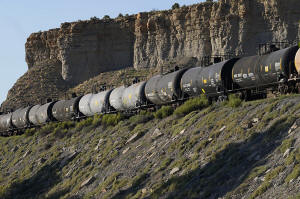Supreme Court scales back a key environmental law in a ruling that could
speed development projects
[May 30, 2025] By
LINDSAY WHITEHURST and HANNAH SCHOENBAUM
WASHINGTON (AP) — The Supreme Court on Thursday narrowed the scope of
environmental reviews required for major infrastructure projects in a
ruling that could accelerate development of railroads, highways and
pipelines around the country.
The 8-0 decision follows an appeal to the high court from backers of a
multibillion-dollar oil railroad expansion project in Utah, which is
aimed at quadrupling oil production in the remote area of sandstone and
sagebrush.
Environmental groups said the decision would have sweeping impacts on
how the National Environmental Policy Act is applied. The landmark
environmental law requires federal agencies to study the likely
environmental impacts of government-funded projects in an often lengthy
review process.
President Donald Trump's administration has already said it's speeding
up that process after the president in January declared a “national
energy emergency” and vowed to boost U.S. oil and gas production.
Justice Brett Kavanaugh referred to the decision as a “course
correction” in an opinion fully joined by four conservative colleagues.
“Congress did not design NEPA for judges to hamstring new infrastructure
and construction projects,” he wrote. The three liberal justices agreed
the Utah project should get its approval, but they would have taken a
narrower path.
The justices reversed a lower court decision that required a more
thorough environmental assessment and restored an important approval
from federal regulators on the Surface Transportation Board.

The board’s chair, Patrick Fuchs, said the ruling reins in the scope of
environmental reviews that are “unnecessarily hindering” infrastructure
construction throughout the country.
The case centers on the Uinta Basin Railway, a proposed 88-mile
(142-kilometer) expansion that would connect the oil-rich region of
northeast Utah to the national rail network, allowing oil and gas
producers to access larger markets and sell to refineries near the Gulf
of Mexico. The state's crude oil production was valued at $4.1 billion
in 2024, according to a Utah Geological Survey report, and could
increase substantially under the expansion project.
Construction, though, does not appear to be imminent. Project leaders
must win additional approvals and secure funding from private-sector
partners before they can break ground, said Uinta Basin Railway
spokesperson Melissa Cano.
Environmental groups and a Colorado county had argued that regulators
must consider a broad range of potential impacts when they consider new
development, such as increased wildfire risk, the effect of additional
crude oil production from the area and increased refining in Gulf Coast
states.
The justices, though, found that regulators were right to consider the
direct effects of the project, rather than the wider upstream and
downstream impacts. Kavanaugh wrote that courts should defer to
regulators on “where to draw the line” on what factors to take into
account. “The goal of the law is to inform agency decision making, not
to paralyze it,” he said.
[to top of second column] |

A train transports freight on a common carrier line near Price,
Utah, July 13, 2023. (AP Photo/Rick Bowmer, File)
 The court’s conservative majority
has taken steps to curtail the power of federal regulators in other
cases, however, including striking down the decades-old Chevron
doctrine that made it easier for the federal government to set a
wide range of regulations.
Justice Sonia Sotomayor said in a concurrence that the court could
have simply cleared the way for the railway approval by saying that
regulators did not need to consider increased fossil fuel production
tied to the project.
Justice Neil Gorsuch did not participate in the case after facing
calls to step aside over ties to Philip Anschutz, a Colorado
billionaire whose ownership of oil wells in the area means he could
benefit if the project goes through. Gorsuch, as a lawyer in private
practice, had represented Anschutz.
The ruling follows Trump’s vow to boost drilling and shift away from
former President Joe Biden’s focus on renewable energy to combat
climate change. The administration announced last month it’s
speeding up environmental reviews of projects required under the
same law at the center of the Utah case, compressing a process that
typically takes a year or more into just weeks.
“The court's decision gives agencies a green light to ignore the
reasonably foreseeable consequences of their decisions and avoid
confronting them,” said Sambhav Sankar, senior vice president of
programs at Earthjustice.
Wendy Park, a senior attorney at the Center for Biological
Diversity, said opponents would continue to fight the Utah project.
“This disastrous decision to undermine our nation’s bedrock
environmental law means our air and water will be more polluted, the
climate and extinction crises will intensify, and people will be
less healthy," she said.
Utah Gov. Spencer Cox, a Republican, said the ruling affirms a
“balanced approach” to environmental oversight. He praised the
railroad expansion as a critical infrastructure project that will
help “restore America’s energy independence” and bolster the state's
rural economy.
The project’s public partner, a group of seven Utah counties, also
applauded the ruling. “It represents a turning point for rural Utah
— bringing safer, sustainable, more efficient transportation
options, and opening new doors for investment and economic
stability," said Keith Heaton, director of the Seven County
Infrastructure Coalition.
___
Schoenbaum reported from Salt Lake City.
All contents © copyright 2025 Associated Press. All rights reserved
 |